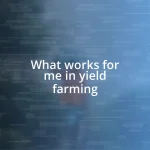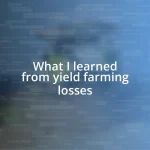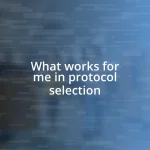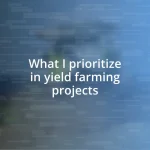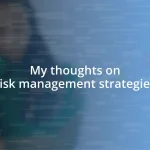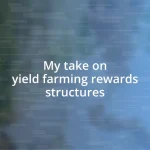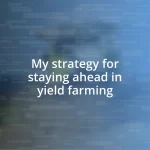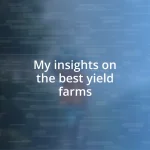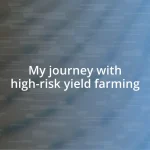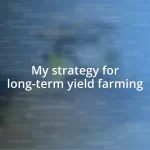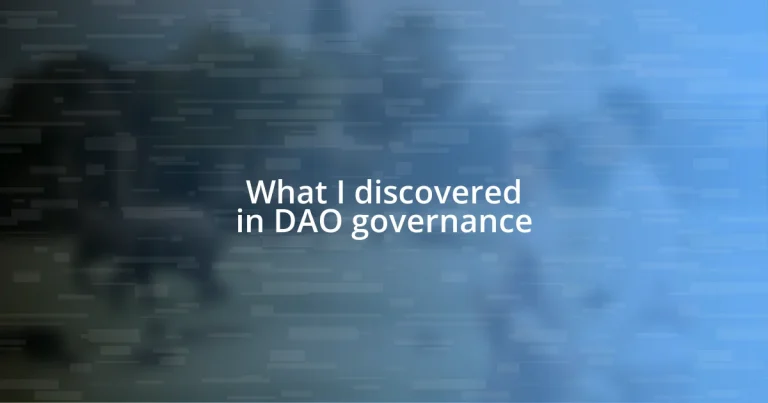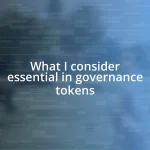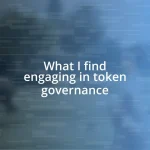Key takeaways:
- Decentralization, transparency, and consensus are foundational principles of effective DAO governance that empower community involvement.
- Key roles in DAO governance include proposers, voters, and delegates, each playing a crucial part in decision-making and representation.
- Future trends involve hybrid governance models, the use of AI tools for data analysis, and a focus on educating community members to enhance engagement and participation.
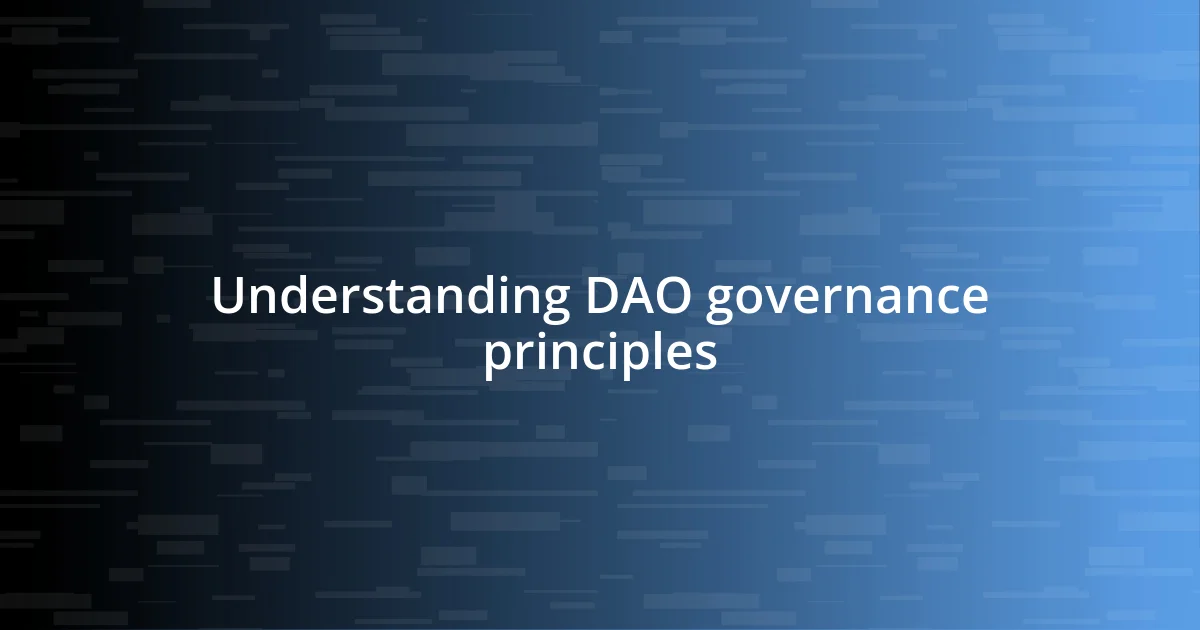
Understanding DAO governance principles
When delving into DAO governance principles, one key concept that stands out to me is decentralization. This idea makes me reflect on a time when I participated in a voting process for a DAO proposal. The sheer empowerment I felt, knowing my voice could directly influence outcomes, was exhilarating. Doesn’t it feel incredible to take part in a system where traditional hierarchies don’t dictate decisions?
Another principle that resonates is transparency. In my experience, effective DAO governance thrives on clear information sharing. I fondly remember reviewing governance proposals and engaging in open discussions with community members. It was empowering to see how everyone had access to the same information, creating a level playing field. Have you ever experienced that rush of clarity when everyone is on the same page?
Finally, consensus is crucial within DAO governance. While it can sometimes lead to lengthy debates, I’ve found that reaching a consensus often results in stronger, more thoughtful decisions. I recall a particularly intense discussion over a project direction; the differing opinions ultimately shaped a compromise that strengthened our community. Isn’t it fascinating how diverse viewpoints can weave together to create a richer tapestry of ideas?

Key roles in DAO governance
In the realm of DAO governance, several key roles stand out that are pivotal to its functionality. I’ve often seen community members stepping into the role of proposers, who champion initiatives that shape the DAO’s trajectory. Their ability to identify opportunities and articulate visions is crucial. I remember when a proposal I supported went live; it was exhilarating to see the community rally behind an idea I believed in passionately.
Another critical role is that of voters. Everyone wants their input to count, and in a DAO, the voting mechanism is where empowerment truly manifests. I can still feel the anticipation I experienced waiting for the results of a vote where I had cast my ballot for a transformative change. Knowing that my decision was part of a collective movement made each moment leading up to the vote feel electrifying.
Lastly, we must acknowledge delegates. These individuals often take on the responsibility of representing voters’ interests. During my time in a DAO, I decided to delegate my voting power to someone I trusted, believing they could make informed decisions on my behalf. It felt like I was passing the baton to someone who could carry our voice further. There’s something deeply satisfying about collaboration in such a system.
| Role | Description |
|---|---|
| Proposers | Individuals who design and present new initiatives for community consideration. |
| Voters | Members who actively participate in the decision-making process through casting votes. |
| Delegates | Representatives entrusted with voting power on behalf of others. |
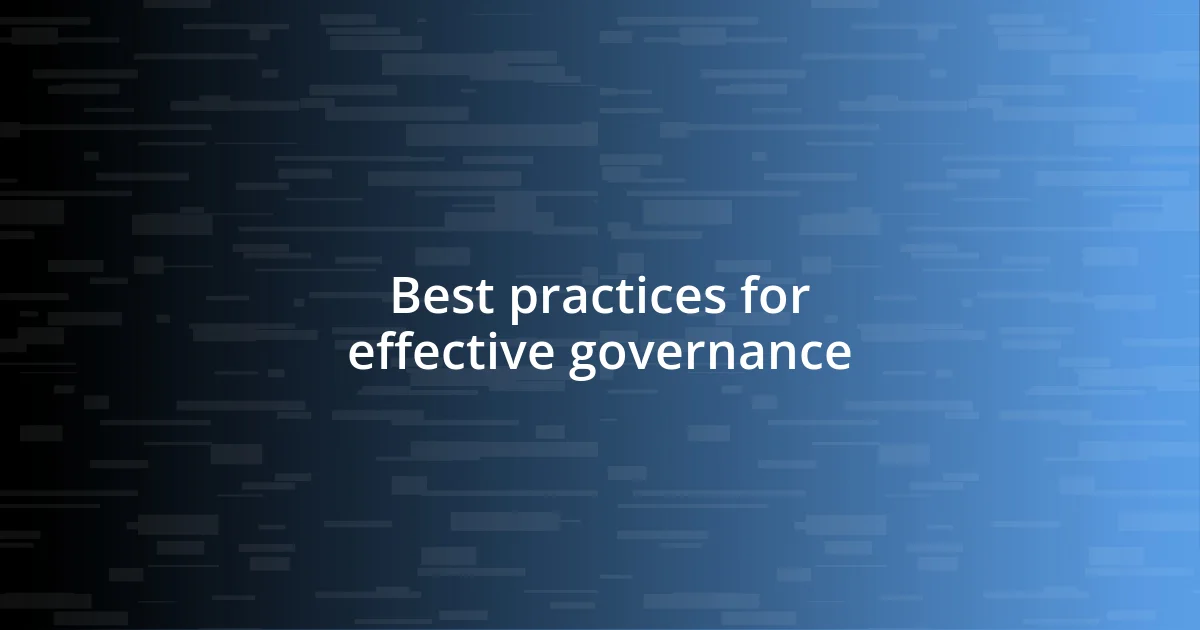
Best practices for effective governance
Effective governance in DAOs hinges on establishing clear communication channels and fostering an inclusive environment. I’ve found that creating dedicated spaces for discussions can significantly enhance the decision-making process. For instance, during one particular proposal review, the community set up weekly check-ins for members to share thoughts. This approach not only built trust but also allowed for a more comprehensive evaluation of ideas before they reached the voting stage. Isn’t it remarkable how a little structure can lead to better outcomes?
To ensure successful governance, consider these best practices:
- Encourage Open Dialogues: Host regular meetings for members to voice concerns and suggestions.
- Utilize Transparent Documentation: Keep clear, organized records of discussions and decisions accessible to all.
- Implement Feedback Mechanisms: Use surveys or polls to gauge community sentiment and areas for improvement.
- Establish Clear Voting Procedures: Calm any confusion by outlining how voting works, what counts as a majority, and what happens afterward.
- Champion Diversity in Participation: Actively invite input from underrepresented voices to enrich discussions.
Cultivating these practices creates a fertile ground for innovation and unity among members.
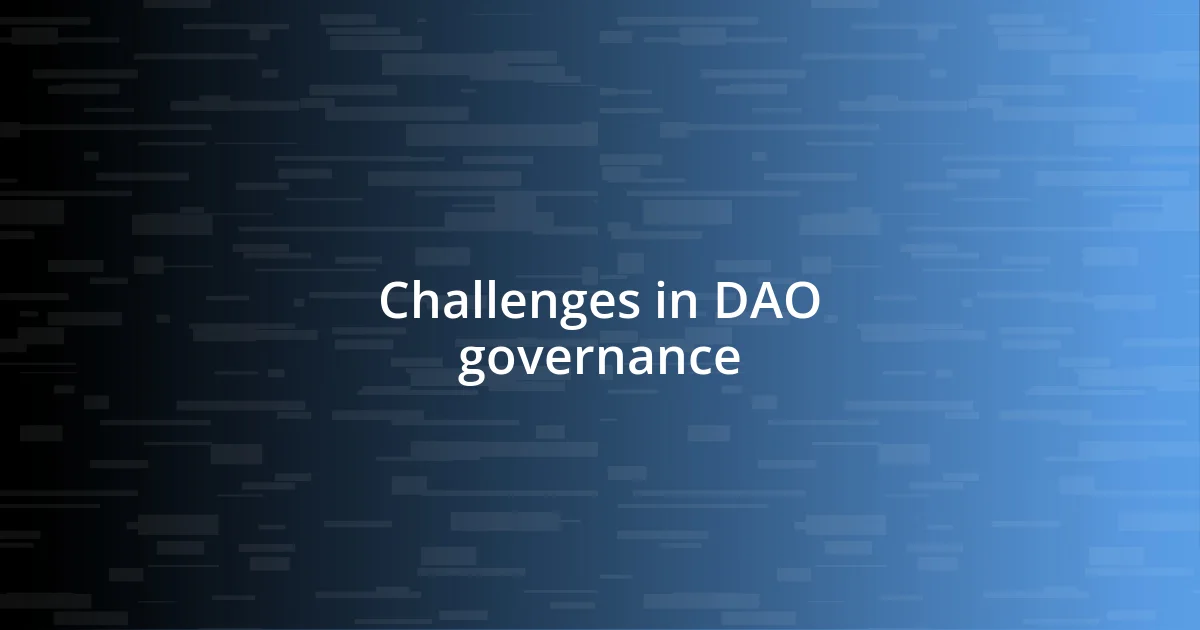
Challenges in DAO governance
Navigating the complexities of DAO governance can feel overwhelming at times. One major challenge I’ve observed is the disconnect between diverse community members and their priorities. For instance, during a particularly heated debate about funding allocation, I noticed how different groups had conflicting visions. It made me question how we could create a cohesive strategy that genuinely represents everyone’s interests.
Another hurdle is the potential for low participation in voting processes. I’ve experienced moments where an essential vote had a surprisingly low turnout, leaving me wondering if we were truly capturing the community’s voice. It’s easy to feel disheartened when those critical decisions rest on a handful of votes.
Adding to these difficulties is the risk of governance being dominated by a few influential players. I’ve seen this firsthand in one DAO where decisions were heavily swayed by a small group of individuals with strong opinions. This can foster a sense of disenfranchisement among the broader community. How do we ensure that every voice counts equally? It’s a conundrum that calls for innovative solutions to balance power effectively and maintain the spirit of collaboration.
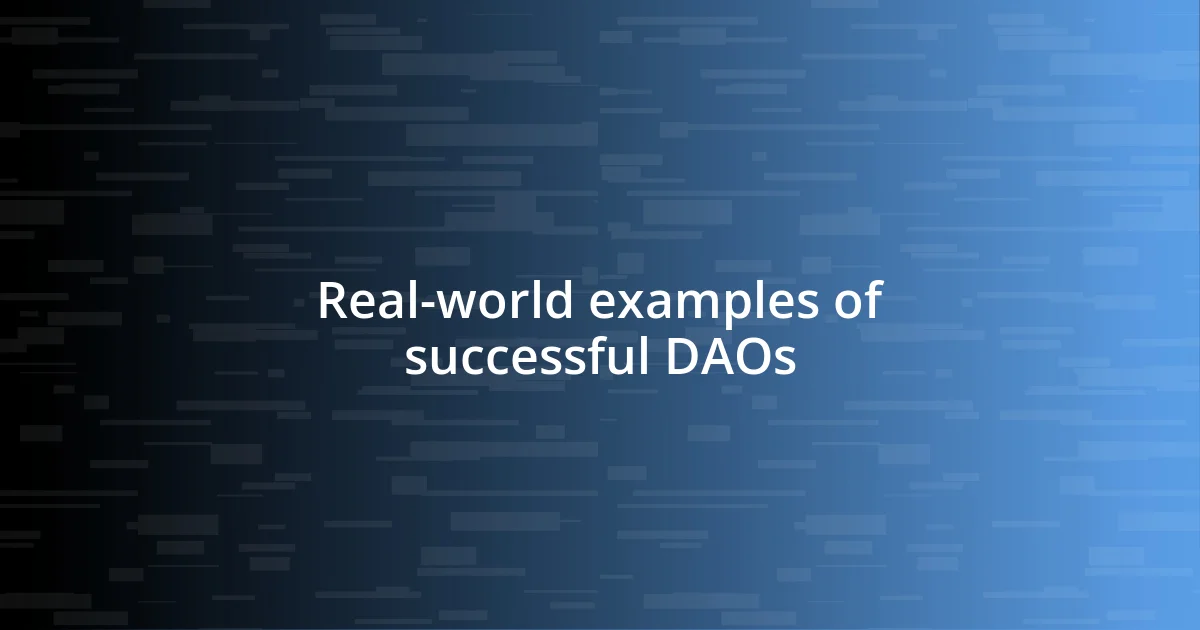
Real-world examples of successful DAOs
One standout example of a successful DAO is MakerDAO, which governs the DAI stablecoin. I remember when I first explored MakerDAO; I was struck by how its community-driven approach allowed users to propose and vote on changes that impact the stability and integrity of DAI. The transparent nature of its governance process made me appreciate how empowered users felt in maintaining such an essential financial tool within the crypto ecosystem.
Another successful instance is the Gitcoin DAO, which focuses on funding open-source projects. In participating in one of their rounds, I witnessed how community members passionately debated which projects deserved funding. The excitement and engagement palpable during the discussions made it clear that this collaborative model not only drives innovation but also creates a sense of shared ownership among developers and sponsors alike. Have you ever felt that sense of community ownership? It can be exhilarating!
Then there’s the Moonbeam Network DAO, which has made significant strides in developing cross-chain functionalities. I found their approach particularly fascinating as they empowered builders to submit proposals using their own creative visions. It struck me how fostering such an inclusive environment can lead to groundbreaking advancements in the blockchain space. The project became a testament to the power of community-led initiatives, sparking inspiration and excitement for many in the crypto realm.
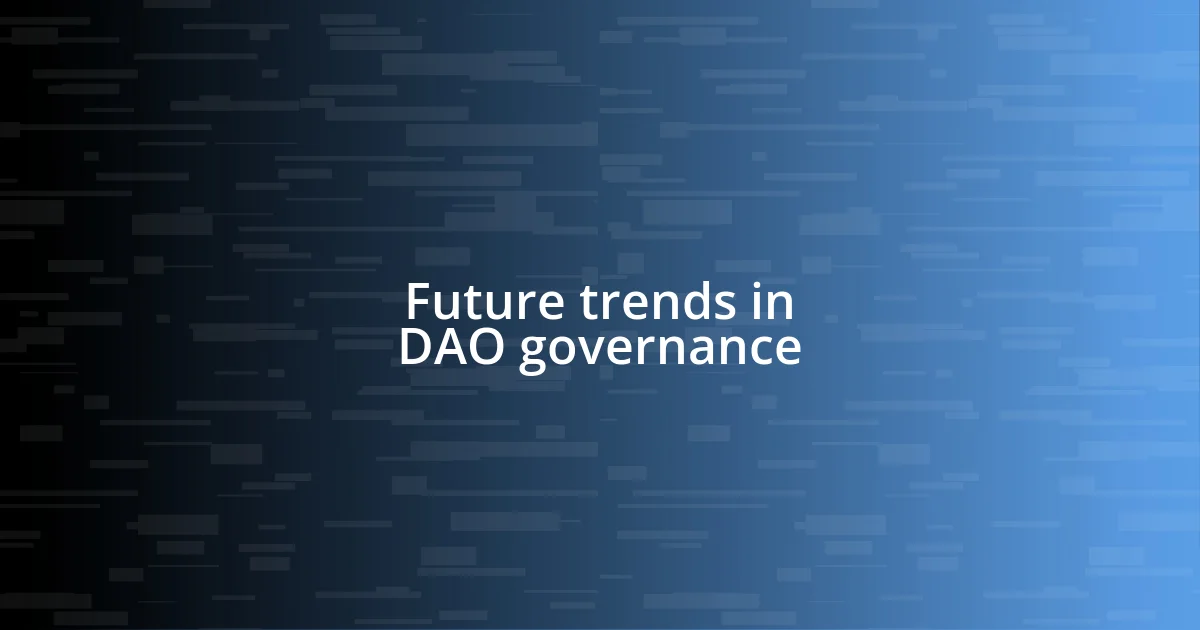
Future trends in DAO governance
I’ve noticed a growing trend where DAOs are increasingly experimenting with hybrid governance models. For instance, the integration of on-chain and off-chain decision-making processes allows for more flexibility. I remember being part of a DAO that used a combination of direct voting and representative councils to guide decisions. It struck me how this blend improved engagement, as many members felt they could participate more actively when given varied avenues to express their opinions.
Moreover, we’re likely to see a rise in the use of AI tools in DAO governance. I’ve come across projects exploring AI for data analysis to identify trends within the community’s preferences. This not only streamlines the decision-making process but also enhances transparency. Have you ever wondered how machine learning can elevate our understanding of collective sentiment? It made me feel optimistic about the potential for technology to bridge gaps in participation and expressiveness.
Looking ahead, I believe that the emphasis on educational resources for community members will become crucial. In my experience, I’ve seen how a lack of understanding can lead to low engagement. By providing detailed guides and interactive workshops, DAOs can empower their members to take on more active roles. Imagine if every participant felt confident and knowledgeable enough to voice their ideas and vote—how transformative would that be for our collective progress? This is something I truly hope to see develop in the future.
